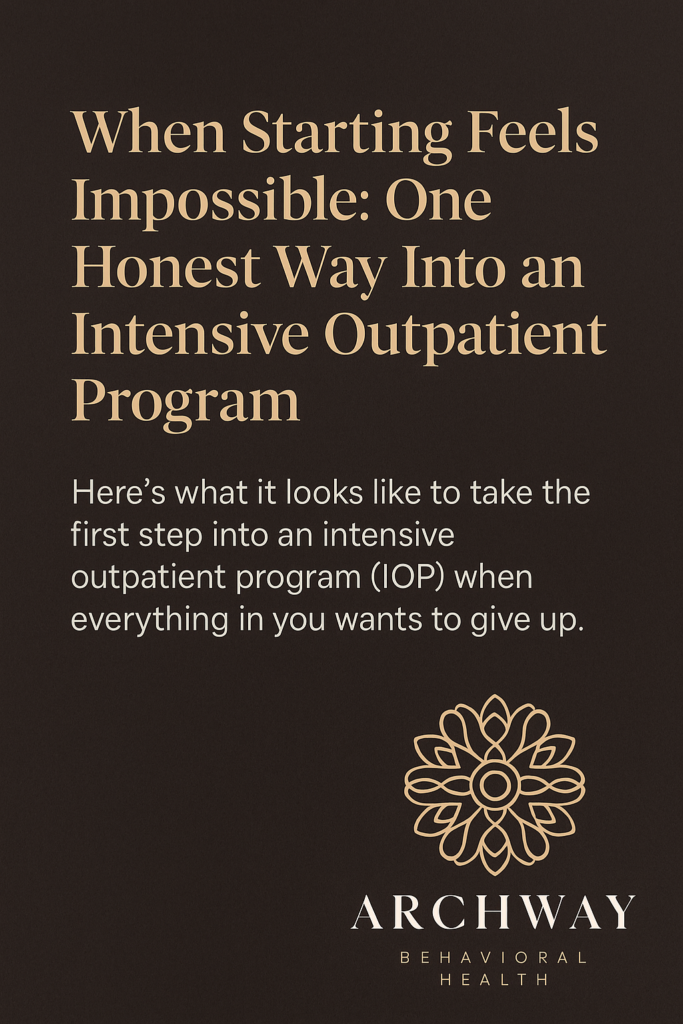I had just relapsed after three months sober. Ninety-four days, to be exact. I wasn’t a newbie anymore, but I felt like the biggest failure in the room. What crushed me the most wasn’t the relapse itself—it was the shame. The silence. The idea that I’d have to start over, explain myself, rebuild trust, and somehow muster the strength to say, “I need help,” again.
If you’re there—if you’re reading this from a place of hopelessness, exhaustion, or just plain emotional numbness—this isn’t another lecture. This is me, one relapsed peer to another, telling you that recovery doesn’t disappear just because you slipped. And getting back into a program doesn’t have to feel like climbing a mountain barefoot.
Here’s what it looks like to take the first step into an intensive outpatient program (IOP) when everything in you wants to give up.
1. You Don’t Have to Be Ready—Just Willing Enough to Try
If you’re waiting to “feel ready,” you’ll be waiting forever. I kept putting it off because I didn’t feel strong enough or motivated or even convinced that I wanted sobriety anymore. That’s the mind trap relapse puts you in: it convinces you that if it’s not 100% certainty, it’s not worth doing.
But willingness doesn’t have to look heroic. It can look like opening a browser and Googling “intensive outpatient program in Boca Raton.” It can be as small as picking up the phone and hanging up before it rings—but still saving the number.
At Archway Behavioral Health, they understand that people coming into IOP aren’t always beaming with motivation. They’re often tired, skeptical, and scared. And that’s okay. They meet you there.
2. Find a Program That Won’t Punish You for Relapsing
Some treatment environments—frankly—feel like starting over in a shame suit. They treat relapse like failure instead of feedback. You don’t need that.
You need a place that remembers your progress, even if it paused. That helps you understand what broke down last time—not as a punishment, but as an invitation to heal deeper.
Archway’s intensive outpatient program in Boca Raton, Florida is designed exactly for this. It offers structure, accountability, and therapeutic support without requiring you to uproot your entire life. You can rebuild trust in yourself one session at a time—no judgment, no lectures.
3. Take the Smallest Next Step—Not the Whole Journey
You don’t have to walk into a center tomorrow with a packed bag and perfect attitude. All you need to do is ask a question. Here are a few low-pressure things you can do:
- Call Archway Behavioral Health at [888-488-4103] and just ask what their IOP includes.
- Ask about your insurance coverage or payment plans.
- Schedule a free assessment. You don’t have to commit—just talk.
Every step you take reduces the fear in your head. Once I finally made the call, I realized it wasn’t nearly as intimidating as the story I’d built around it.
4. Say the Truth Out Loud (Even If It’s Ugly)
Here’s what I wish someone had told me: you don’t have to clean yourself up before walking back into treatment. You don’t have to pretend you’re “ready this time” or come armed with new insights. Just tell the truth.
Tell them if you used yesterday. Tell them if you’ve been isolating. Tell them if you’re not even sure you believe in sobriety anymore. The right program will take that truth and say, “Okay. Thanks for being real. Let’s start here.”
That kind of honesty builds something deeper than sobriety. It builds self-respect.
“When I came back, I thought I’d be met with eye rolls. Instead, I was met with a chair that had been waiting for me.”
– IOP Client, 2024
5. Let People In, Even If You Feel Like Hiding
Shame thrives in silence. And the longer you stay isolated, the louder the lies get: You’re a failure. You’re too far gone. No one wants you back. That’s what my relapse told me every night at 2 AM.
The truth? People do want you back. Your seat is still warm. Call someone who’s safe. Tell them you’re thinking about returning to IOP. Ask them to check in tomorrow. Better yet, let them drive you to intake or sit with you while you make the call.
You don’t need to recover in the shadows. That’s where addiction lives. Healing happens in the light.
Frequently Asked Questions About Intensive Outpatient Programs
What is an Intensive Outpatient Program (IOP)?
An IOP is a structured form of treatment that allows you to live at home while attending therapy sessions, support groups, and clinical check-ins several times per week. It’s designed for people who need consistent support but don’t require 24/7 care.
Is IOP a good option after relapse?
Yes. IOP is often ideal for those who have relapsed but still have a foundation of recovery. It offers accountability and community while allowing you to rebuild without starting from zero.
What’s the schedule like at Archway’s IOP?
Archway Behavioral Health offers flexible scheduling, often including day and evening groups. This allows you to work, care for family, or manage other responsibilities while receiving treatment.
Will they judge me for relapsing?
No. Archway specializes in compassionate, real-world recovery support. They understand that relapse can be part of the journey—not the end of it.
How do I start the process?
Just call [888-488-4103] or visit their intensive outpatient program page to schedule a confidential assessment.
Ready to Come Back?
You’re not a lost cause. You’re not a disappointment. You’re someone who tried, and who’s willing to try again. That matters more than you know.
📞 Call Archway Behavioral Health at [888-488-4103]
Or explore their intensive outpatient program in Boca Raton to take that first small—but powerful—step.
Your seat’s still here. Whenever you’re ready.



